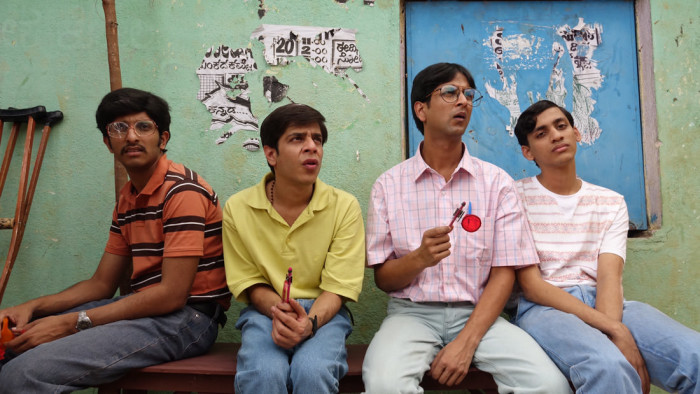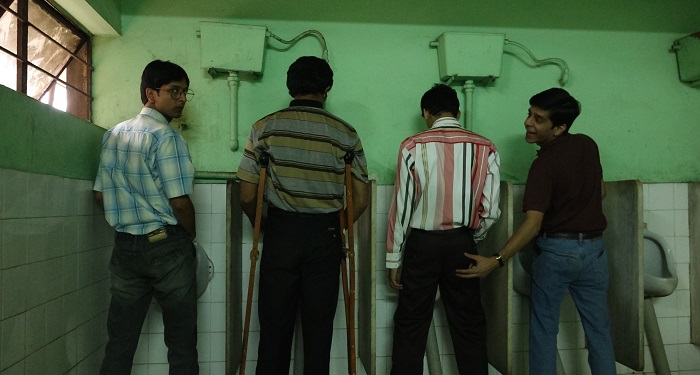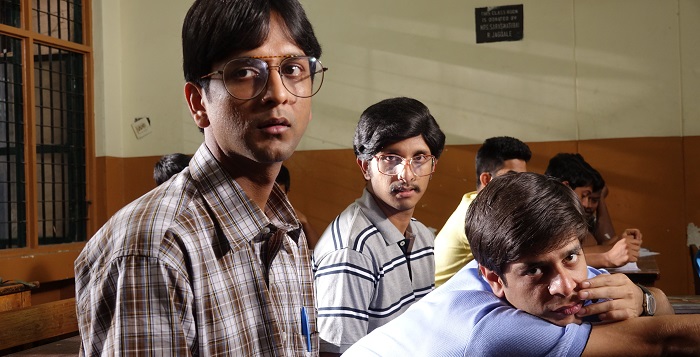Interview: Q talks directing Netflix’s Indian sex comedy Brahman Naman
Matthew Turner | On 02, Jul 2016
Set in Bangalore in the 1980s, Netflix’s latest original film, Brahman Naman, follows the exploits of a high school quiz champ who leads his nerdy friends on a trip to Calcutta to win a major college prize. Young, smart and full of heart, the trio are determined to win the quiz – and to lose their virginity along the way.
The film is released on Netflix worldwide on Thursday 7th July, following a UK premiere at the Edinburgh Film Festival. We hopped over to Scotland to catch up with the director, Q, and talk directing Netflix’s first Indian coming-of-age sex comedy.
Can you talk about how Netflix got involved with the project?
We co-produced it with Riley Production with the principal producer, Steve Barron and on our end, that was [producer] Celine Loop. And the major factor was UTA [United Talent Agency], who are our agents, and so we were building the film up and the Sundance competition selection obviously helped a lot. After the first screening of the film, where UTA had been able to gather together quite a few buyers, I think the buzz started building and then there was a bidding process and that’s how Netflix got us. It was entirely organic. This was completely new for us, it’s a new territory, even for Netflix, I would say, because they’re coming into Asia now, properly. So I think it was a good time, and we were in the right place at the right time and the film had enough zing to hold it as a universal film.
How did you become involved in the project?
So, quite like a proper European and British project, this was the writer’s idea, Naman Ramachandran, who’s borrowing heavily from his life and his friends. And that was an interesting story, because actually this was nothing that he had ever thought of writing about. But while Steve and him were hanging out, doing some other work, he kept telling Steve these really funny and bizarre stories about his time in college and quizzing and stuff. And Steve, being the British gent and an elderly punk, he totally got this humour and he’s the one who suggested to Naman that he should write it down. At that point, Steve was supposed to actually direct it, but then Stephen saw my film [Gandu (The Loser)] at the London Film Festival and he was very impressed and he told Naman, ‘Why don’t we work with Q?’ and that’s how it came to me.
I had no idea that Naman was even writing this – I’ve known him for some time now, but he had never told me this. And this was a secret, and then it suddenly landed in my e-mail box and I had no idea who Steve was, and then Naman admonished me for it, for not knowing who Steve was – ‘You’re the ultimate loser, you don’t know who Steve is!’ I said, ‘Okay, fine’, and then I did some research and I was like, ‘Shit, this is good stuff’. I have a killer script, which you can’t get in India, a killer comedy script from an Indian living in Britain, so he’s very much British now, so that sort of really cool British wit, and then placing it in this bizarre Bangalore of the 80s, that was incredible and I saw a lot of opportunity in the script, for me to work on, and I saw a lot of physical stuff that I could do. I could play on subtext, I could get all these conditions in.
There’s a kind of inevitable comparison with American Pie because of some of the scenes that you have. How much did you let that in, if you like, to the film?
I think just the placement of it in India and the 1980s changes everything. It cannot be looked at as American Pie because we were not American. Now, we’re American, possibly – now, you could make a current film about this topic [sex comedy] and it might be like American Pie. I would say that there have been some really stupid sex comedies made in India which are kind of going into that zone – for us, it was not really American Pie, it was more Napoleon Dynamite and Portnoy’s Complaint and back in time, it was not like modern boys who are stupid, it’s like really intelligent boys who are not stupid, but they’re stupid because they’re driven by their penis. It’s just a malady, and of course we had a better grip on literature than American Pie would ever have, so I think we were safe from that angle. Having said that, we were very much influenced by The Inbetweeners and, like I said, by Napoleon Dynamite. Those are firms that we really wanted to be closer to. The American Pie factor comes in anyway, because it’s a jerk-off film, and jerk-off films have that tendency, they are all the same, they are all jerking off.
I thought Portnoy’s Complaint too, actually…
Portnoy’s Complaint was my first thing, for sure, because Steve was Napoleon Dynamite, Naman was The Inbetweeners, I was Portnoy’s Complaint, and between the three of us, we were like, ‘Okay, this is going somewhere’.
Are you anticipating any censor problems with the fish tank scene?
I think the censor question is something that we are not thinking about right now, because Netflix is my distributor. And as distributors do, they have the control of the film, they will decide on these things and we are going global, we are not going regional, in a way that only a particular kind of community will be looking at it. So I would say that Netflix should answer this question, not me anymore, thankfully!
Clearly you enjoyed the 80s production design side of it. Were there things that you particularly wanted to have in the film?
You know, this is something that we thought really deeply about, because we didn’t have money. We were doing a really low budget film. So the period factor couldn’t be brought in through production value. We did not have the money to get a period car to cross the frame. So instead, we said fuck the period car, we don’t need the props – we’ll just shoot against the wall. But what we’ll do is that we’ll shift the time and the time will give us that period feel, so if you see these long takes with these guys talking at a certain pace, which is slower than how even I speak now, this is not how they were speaking. Just slowing everything down was what we were intending to do, to get the period feel, and, of course, the music. The music plays a big role in setting up the time for you, because everyone at that point was listening to these tracks, everyone around the globe. So the moment Locomotive Breath kicks in, you just need a scooter and that’s it. You know, you’re done, because what else? And then you just focus on what’s going on.
I really liked the thing with the end credits, with the quiz answers upside down on the screen at the end. Where did that idea come from?
You know, quizzing was so big then, everything had quiz elements like we used to get comic books with quizzes, newspapers would have quizzes and most of these quizzes would have answers and they would always be on the back page and a lot of the times they would be upside down, in magazines, mostly. So it’s a throwback. Also, for me, I like physical cinema, in that way that people are worried and they’re physically bothered about what’s going on on the screen and they have to move or orient themselves to understand or read the text on the screen, or engage or participate.
How important do you think Netflix and Video On Demand services are to the future of distribution for films like this, and for foreign films in particular?
I think it’s everything. We’ve been waiting for this, as I said, I think VOD and working VOD models that would be able to bypass all these local quotients and local issues and regional sensibilities, this is something that we really needed and now it’s here, and the only way is up. I think there’s a potentially great shift, the whole balance and the dynamic of the market. I think content like this, there will be people like me, out of nowhere, who are going to make films like this, you know? So we’ll get more and more of this, young filmmakers with fresher ideas, and they will not have to think about their idioms that tie them down – instead, they will be thinking out of their boxes, which is what they want to do, and they need to do.
Are you much of a VOD user yourself? What have you been watching and enjoying recently?
Well, I was a big fan of Narcos, I mean, I was really blown [away] by it. Netflix is just entering India properly, so we didn’t have the whole library available to us until last month. So we’re going to have that, but there are other services as well, I mean, lots of things are happening in this medium, so it’s really exciting to see all this finally being available to a place like India or Sri Lanka or Bangladesh.
Brahman Naman is available on Netflix UK, as part of an £9.99 monthly subscription. The film will also be showcased as part of the London Indian Film Festival, from 14th to 24th July 2016.























